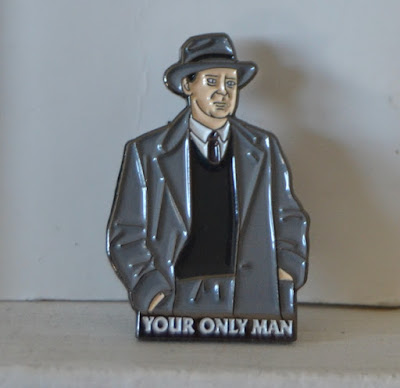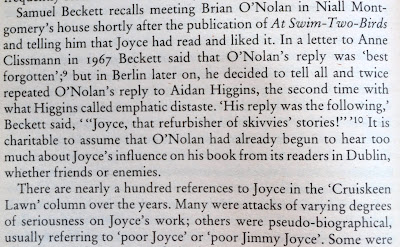Here's a lovely Flann O'Brien badge from the fantastic Three Castles Burning Dublin history podcast. It was a present from my Dublin friend Alfreda O'Brien (a genuine O'Brien, unlike Brian O'Nolan – follow her on Twitter @DublinAffair).
Though you do the best you can
When life looks black as the hour of night
A pint of plain is your only man'
That's from Flann O'Brien's first masterpiece, At Swim-Two-Birds, which was the last novel that James Joyce read. It was published on 3 March 1939, just two months before Finnegans Wake.
The story of how Joyce came to read the book is told in a letter of 1 May 1939 from Brian O'Nolan to Eric Gillett, literary adviser to Longmans, his publishers. I have a photocopy of the letter which Sue Asbee gave me in the early 80s, when we were both postgraduate students at Queen Mary College London.
Sue wrote on the back, 'Peter - this is copyright material! Read it with care!' But it's now been published in the new Collected Letters, so I think it's ok to share it now.
O'Nolan adds an apostrophe to Finnegans Wake. This was an easy mistake to make, since the book would not be published until 4 May. Joyce did have the book 'in his hand as he spoke' since he'd been given an advance copy on 30 January, in time for his birthday party.
The friend who brought the book to Joyce was Niall Sheridan, who was at University College Dublin with O'Nolan. He appears as the character Brinsley in At Swim-Two-Birds, and he played a big role in the book's creation – cutting one fifth of the text according to his own account.
Here's how Anthony Cronin describes Sheridan in No Laughing Matter: The Life and Times of Flann O'Brien:
It's fitting that Sheridan became a tipster. His interest in the horses features in At Swim-Two-Birds. A Newmarket racing tipster's letter ('This horse is my treble nap CAST-IRON PLUNGER') which he showed O'Nolan is quoted verbatim in the book.
In his essay, 'Brian, Flann and Myles' in Myles: Portraits of Brian O'Nolan, 1969, Sheridan records how 'Brian gleefully borrowed any material that came to hand.'
This was also James Joyce's attitude to writing Finnegans Wake. He told Eugene Jolas, 'Really it is not I who am writing this crazy book. It is you, and you, and you, and that man over there, and that girl at the next table.'
In his essay, Sheridan describes being part of a team of writers that O'Nolan assembled to 'manufacture' the Great Irish Novel, to be called Children of Destiny. It would be 'the first masterpiece of the Ready-Made or Reach-Me-Down School’ of novel writing.' Sheridan's job was to write the book's climax, set in an All-Ireland Football Final at Croke Park. Sadly, the book never materialized.
In the Irish Times, the great Frank McNally described a talk by Dr Maeb Long which revealed that, in 1939, Sheridan wrote a story with striking similarities to The Third Policeman. Called 'A Matter of Life and Death', it featured a murder with a bashed in skull and a police sergeant obsessed with the theft of bicycles.
SHERIDAN'S VERSION
Sheridan gives his own version of his meeting with Joyce in 'Brian, Flann and Myles'.
LAUGHING JEAN AND WEEPING JEAN
 |
| 19th century busts of weeping Jean and laughing Jean |
According to Cronin, the source of the quotation is a letter from Sheridan to the publisher Timothy O'Keefe. He must have had a lot more to say about what Joyce thought of the book. It's a shame that Joyce's letters to Sheridan have never been published.










